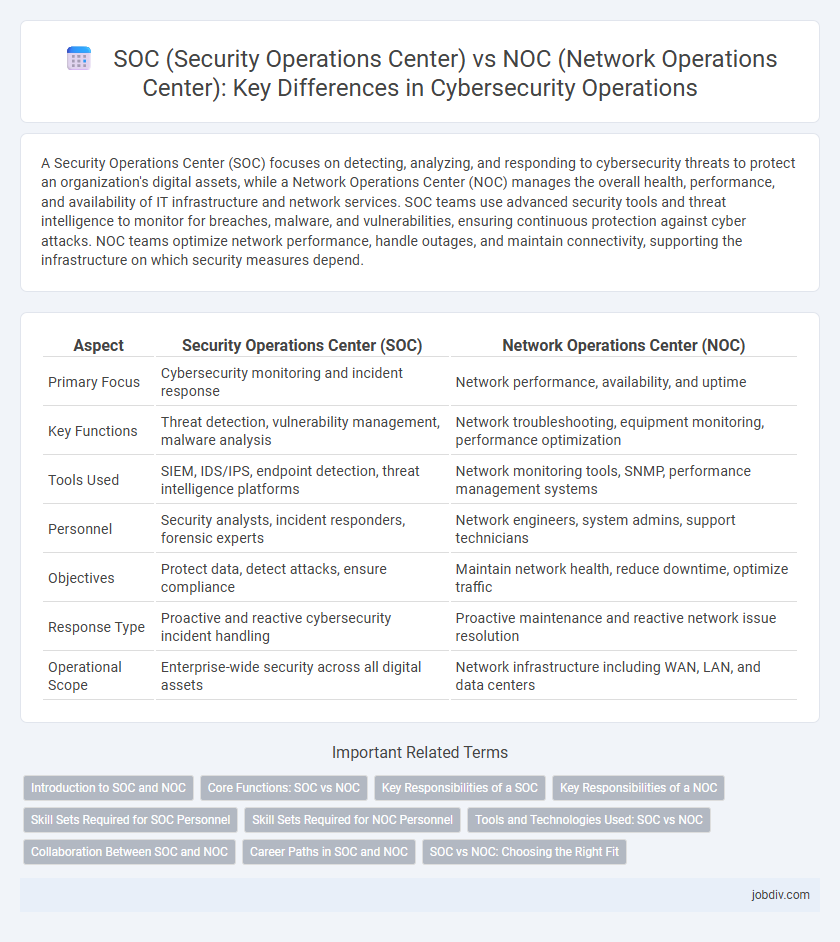A Security Operations Center (SOC) focuses on detecting, analyzing, and responding to cybersecurity threats to protect an organization's digital assets, while a Network Operations Center (NOC) manages the overall health, performance, and availability of IT infrastructure and network services. SOC teams use advanced security tools and threat intelligence to monitor for breaches, malware, and vulnerabilities, ensuring continuous protection against cyber attacks. NOC teams optimize network performance, handle outages, and maintain connectivity, supporting the infrastructure on which security measures depend.
Table of Comparison
| Aspect | Security Operations Center (SOC) | Network Operations Center (NOC) |
|---|---|---|
| Primary Focus | Cybersecurity monitoring and incident response | Network performance, availability, and uptime |
| Key Functions | Threat detection, vulnerability management, malware analysis | Network troubleshooting, equipment monitoring, performance optimization |
| Tools Used | SIEM, IDS/IPS, endpoint detection, threat intelligence platforms | Network monitoring tools, SNMP, performance management systems |
| Personnel | Security analysts, incident responders, forensic experts | Network engineers, system admins, support technicians |
| Objectives | Protect data, detect attacks, ensure compliance | Maintain network health, reduce downtime, optimize traffic |
| Response Type | Proactive and reactive cybersecurity incident handling | Proactive maintenance and reactive network issue resolution |
| Operational Scope | Enterprise-wide security across all digital assets | Network infrastructure including WAN, LAN, and data centers |
Introduction to SOC and NOC
Security Operations Center (SOC) is a centralized unit responsible for monitoring, detecting, and responding to cybersecurity threats using advanced tools and threat intelligence. Network Operations Center (NOC) focuses on managing and maintaining network infrastructure to ensure optimal performance, uptime, and troubleshooting network issues. Both SOC and NOC play crucial roles in organizational security, with SOC emphasizing proactive threat management and NOC ensuring network reliability.
Core Functions: SOC vs NOC
The core function of a Security Operations Center (SOC) is to monitor, detect, analyze, and respond to cybersecurity threats in real-time, utilizing advanced threat intelligence and incident response protocols. In contrast, a Network Operations Center (NOC) primarily focuses on maintaining network performance, ensuring uptime, and managing infrastructure issues such as routers, switches, and servers. While SOC prioritizes active threat mitigation and cybersecurity defense, NOC emphasizes network health, availability, and fault resolution.
Key Responsibilities of a SOC
A Security Operations Center (SOC) focuses on continuous monitoring, detecting, and responding to cybersecurity threats and incidents to protect an organization's data and infrastructure. Key responsibilities include threat intelligence analysis, incident response management, vulnerability assessment, and ensuring compliance with security policies. SOC analysts utilize advanced security information and event management (SIEM) tools to proactively identify risks and mitigate cyberattacks.
Key Responsibilities of a NOC
A Network Operations Center (NOC) is responsible for monitoring, managing, and maintaining an organization's IT infrastructure, including servers, network devices, and telecommunications. Key responsibilities include network performance monitoring, troubleshooting connectivity issues, ensuring uptime, and managing hardware and software updates. NOCs play a critical role in preventing network outages and ensuring reliable data flow across enterprise networks.
Skill Sets Required for SOC Personnel
Security Operations Center (SOC) personnel require advanced skills in threat detection, incident response, and cybersecurity technologies such as SIEM, IDS/IPS, and endpoint protection. Proficiency in malware analysis, forensic investigation, and understanding of compliance frameworks like NIST and ISO 27001 is essential. SOC analysts must also possess strong analytical thinking and communication skills to effectively manage security incidents and coordinate with stakeholders.
Skill Sets Required for NOC Personnel
NOC personnel require expertise in network infrastructure monitoring, troubleshooting, and performance optimization to ensure continuous uptime and connectivity across complex systems. They must possess skills in managing routers, switches, firewalls, and network protocols, alongside proficiency in incident response and ticketing systems. Strong analytical abilities and knowledge of network security fundamentals enhance their capacity to support seamless operations and mitigate potential threats in coordination with SOC teams.
Tools and Technologies Used: SOC vs NOC
Security Operations Centers (SOCs) employ advanced threat detection tools such as SIEM (Security Information and Event Management), IDS/IPS (Intrusion Detection and Prevention Systems), and endpoint detection and response (EDR) platforms to monitor and analyze security threats in real-time. Network Operations Centers (NOCs) utilize network management systems, performance monitoring tools, and traffic analyzers to ensure network uptime, troubleshoot connectivity issues, and optimize network performance. While SOC tools focus on cybersecurity incident detection and response, NOC technologies prioritize network health, availability, and infrastructure management.
Collaboration Between SOC and NOC
Effective collaboration between Security Operations Center (SOC) and Network Operations Center (NOC) enhances real-time threat detection and rapid incident response by combining security expertise with network performance monitoring. Shared visibility into network traffic and coordinated communication protocols enable both centers to proactively address vulnerabilities and minimize downtime. Integrating SOC's threat intelligence with NOC's infrastructure management ensures comprehensive protection and optimized system resilience.
Career Paths in SOC and NOC
Career paths in Security Operations Centers (SOC) typically focus on cybersecurity roles such as incident responders, threat analysts, and SOC managers, emphasizing real-time threat detection and response. Network Operations Center (NOC) careers tend to center around network monitoring, infrastructure management, and system optimization roles like network engineers and NOC supervisors, prioritizing uptime and performance. Both paths offer progression into specialized domains--SOC careers advance into advanced cybersecurity fields like penetration testing, while NOC professionals may evolve into network architecture and infrastructure design.
SOC vs NOC: Choosing the Right Fit
Selecting between a Security Operations Center (SOC) and a Network Operations Center (NOC) depends on organizational priorities; SOC focuses on threat detection, incident response, and cybersecurity defense, while NOC emphasizes network performance, uptime, and infrastructure monitoring. Organizations facing advanced cyber threats benefit from SOC's proactive security analytics, whereas entities prioritizing network stability and troubleshooting align more with NOC functions. Understanding operational goals and risk tolerance guides the decision to implement a SOC, NOC, or a hybrid approach to optimize both network reliability and security posture.
Security Operations Center (SOC) vs Network Operations Center (NOC) Infographic

 jobdiv.com
jobdiv.com